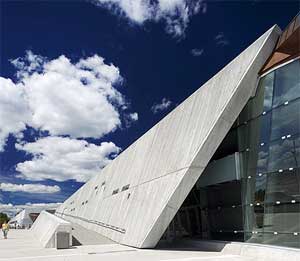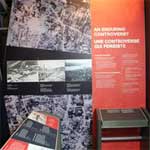 |
| Controversy has erupted over a panel at the Canadian War Museum in Ottawa. |
The panel in question contains just 68 words. And yet many thousands of words have been exchanged in a battle to change them.
Earlier this week, the Canadian War Museum in Ottawa said it would adjust the wording on the panel entitled An Enduring Controversy, which deals with the 1945 firebombing of Dresden. Bowing to pressure from Bomber Command veterans and sympathetic politicians, the museum said the new wording is being drafted and will be installed next month.
The panel currently reads: “The value and morality of the strategic bomber offensive against Germany remains bitterly contested. Bomber Command’s aim was to crush civilian morale and force Germany to surrender by destroying its cities and industrial installations. Although Bomber Command and American attacks left 600,000 Germans dead and more than five million homeless, the raids resulted in only small reductions in German war production until late in the war.”
The dispute over the 68-word panel speaks to the controversy of area bombing itself, a tactic taken by British strategists to bring the war to Nazi Germany’s backyard. The Royal Air Force, which incorporated the Royal Canadian Air Force squadrons, bombed at night and deliberately targeted cities.
|
And then there’s that particularly prickly word — “morality.”
“It’s also a matter of debate as to the effectiveness of area bombing. The underlying gist is if the bombing was immoral and effective, then it would be easier to make the argument that it was justifiable. But if it was immoral and ineffective, then there are no mitigating factors whatsoever.”
That’s why the last sentence of the panel is particularly troublesome to veterans, who had a Senate subcommittee weigh in on the matter. It suggests that if so many civilians died and yet German war production continued apace, then perhaps the campaign was useless.
A similar controversy erupted over the McKenna Brothers’s 1992 documentary The Valour and the Horror. The middle episode, Death by Moonlight: Bomber Command, detailed the blanket bombings of German cities Dresden and Munich. Writers/producers Brian and Terence McKenna argued the bombings caused enormous casualties without hastening the end of the war.
Dr. Bell, who teaches the courses Europe and World War II (HIST 3050) and Winston Churchill (HIST 4117), says the jury’s still out on that point.
“The German war economy was expanding rapidly by 1943, 1944. So when they talk about ‘only small reductions,’ it’s misleading. Without the bombing, German war production would have jumped up much more than it did… It turned out to be an effective way of drawing German resources from other uses.”
On the other hand, asking historians whether or not the Canadian War Museum should have bowed to pressure is a bit of a minefield. While he’s sympathetic to veterans, Dr. Bell says the museum should ultimately have the final say about how it presents its exhibits.
Shirley Tillotson goes one step further and argues that it’s the museum’s job as the “custodians of public memory” to reflect diverse views.
“Museums can’t infinitely accommodate, all we can ask is that they reasonably accommodate,” says Dr. Tillotson, Associate Professor in the Dept. of History, noting that the title “An Enduring Controversy” is spot on.
“It would seem to me that that’s a reasonable expression of this state of affairs.”

